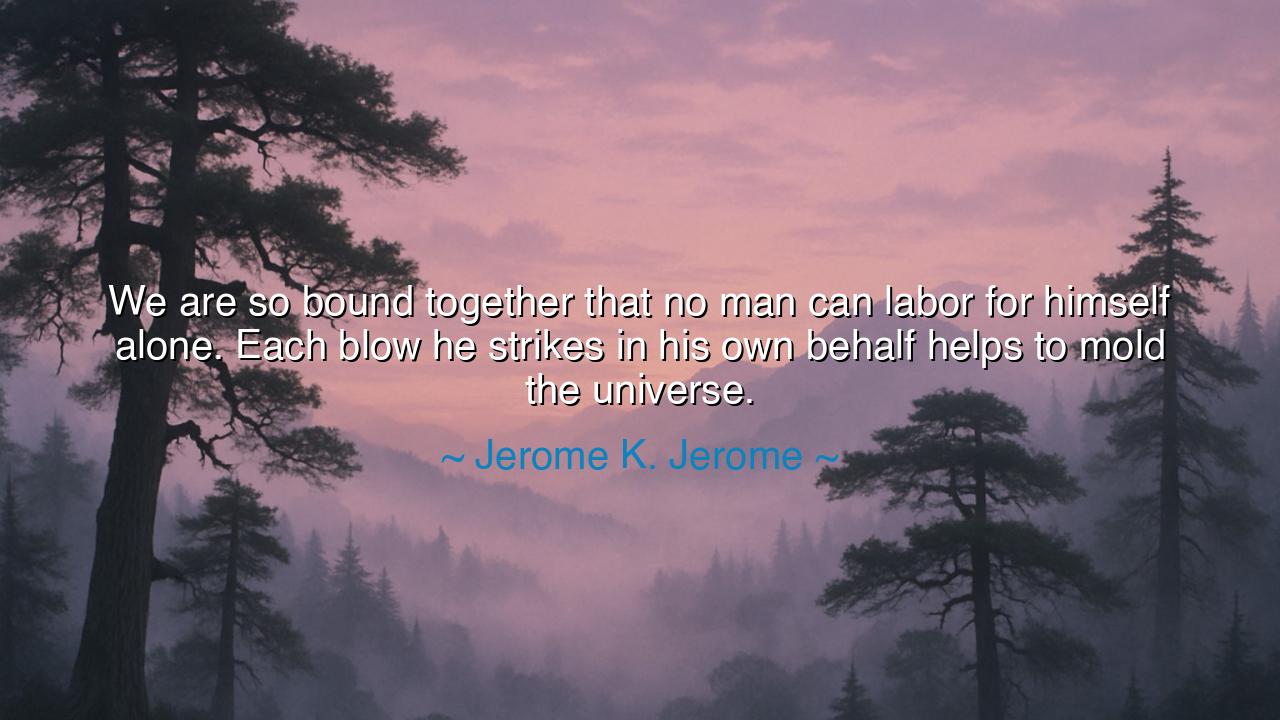
We are so bound together that no man can labor for himself alone.
We are so bound together that no man can labor for himself alone. Each blow he strikes in his own behalf helps to mold the universe.






In the stirring and timeless words of Jerome K. Jerome, he wrote: “We are so bound together that no man can labor for himself alone. Each blow he strikes in his own behalf helps to mold the universe.” These words, rich with humility and revelation, remind us that life is not a solitary struggle but a woven tapestry of shared destiny. Every thought, every action, every effort we make — even those we believe are for ourselves — echoes through the lives of others, shaping not just our own path, but the world itself. It is a truth as old as creation: no man lives alone, for the breath of one soul stirs the winds that touch all others.
When Jerome speaks of being “bound together,” he unveils the divine fabric of existence — the invisible web that links every being to the next. The selfish heart believes that labor belongs to the self, that success is personal, that one’s deeds vanish beyond one’s reach. But the wise know that every act ripples outward, touching unseen shores. The kindness of a single man can soften generations; the cruelty of one may scar centuries. The carpenter who builds for his own bread still shapes the homes of others; the scholar who studies for his own delight still lights torches for minds unborn. Thus, even when we labor “for ourselves,” we are unwitting architects of a greater world.
The origin of this wisdom lies in Jerome’s reflections on human fellowship and moral duty. Though best known for his humor in Three Men in a Boat, he possessed a deep and compassionate understanding of the shared human condition. Living in the late nineteenth century, he observed an age that celebrated individual progress, yet often forgot the invisible threads of interdependence that bound all lives together. His insight carries forward the spirit of ancient truth — that of the Stoics, who taught that mankind is one body, and the suffering of one part diminishes the whole. In these words, Jerome reminds us that selfishness is illusion, and that true greatness lies in recognizing the divine unity of all existence.
History has often proven his words to be not only moral but literal. Consider Isaac Newton, who, through years of lonely labor, sought only to understand the order of nature. He did not imagine himself changing the world, yet his discoveries reshaped human thought, guiding ships across oceans, inspiring generations of scientists, and illuminating the heavens themselves. Or think of Florence Nightingale, who, tending to the wounded in the stillness of night, believed she was fulfilling a simple duty of compassion. Yet her hands, humble and weary, molded the foundations of modern nursing and the sanctity of care. These souls labored for their own callings — yet in doing so, they molded the universe.
Jerome’s teaching is both humbling and ennobling. It tells us that we are co-creators of the world, whether we will it or not. Every choice, every action — even the smallest — shapes the moral landscape of humanity. The artist who paints from the heart awakens joy in the unseen; the worker who labors honestly strengthens the foundation upon which others stand; the parent who loves faithfully cultivates the soil from which compassion grows. There is no labor too small, no intention too hidden, that does not contribute to the cosmic design. To live is to leave an imprint upon eternity.
Yet this truth carries a solemn warning: if our every blow molds the universe, we must strike with care. The angry word, the selfish act, the indifferent heart — these too shape the world, but in shadow rather than light. The universe is not only molded by greatness, but also by neglect. Thus, Jerome’s wisdom calls us not merely to awareness, but to responsibility — to act with reverence, knowing that our private deeds are public prayers, our inner lives the clay of creation.
Let this, then, be the teaching: labor not only for yourself, but for all. In your work, let there be love; in your striving, let there be conscience. See the sacred thread that binds your life to all others, and weave it with care. When you speak, speak to uplift; when you create, create to bless. For every motion of the heart sends ripples into the infinite, and the universe itself is shaped by the hands of those who act in awareness.
Thus, the wisdom of Jerome K. Jerome endures as both a call and a comfort: that no life is meaningless, no effort wasted, no soul forgotten. Every act, no matter how small, participates in the making of the world. To labor for oneself, then, is to labor for all — and to labor for all is to honor the divine unity that binds creation together. In this truth, man ceases to be a solitary being and becomes what he was always meant to be: a builder of the universe.






AAdministratorAdministrator
Welcome, honored guests. Please leave a comment, we will respond soon